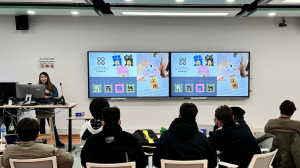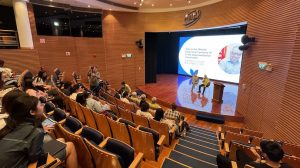The organisational climate in a company can be key to increasing intention to stay among employees, particularly in workplaces where they are subject to high levels of job-related stress, according to a research paper by 3 IFT scholars.
The study indicated that a “positive organisational climate significantly weakened, if not reversed” what would otherwise be a “negative relationship between job stress and intent to stay,” wrote researchers Dr. Louis Vong Tze Ngai, Dr. Henrique Fátima Boyol Ngan and Mr. Patrick Lo Chun Pong. “In other words, a positive organisational climate serves to support or encourage stressed employees to remain with their organisations. Stressed employees’ intention to stay was weakened further in those organisations diagnosed with relatively negative organisational climate.”
The conclusions were featured in the paper “Does organizational climate moderate the relationship between job stress and intent to stay?: Evidence from Macau SAR, China”, published last year in the Journal of Chinese Human Resource Management.
The study was based upon data collected from more than 510 full-time workers in Macao, hailing from various industries. The participants were asked to complete a questionnaire designed to measure their perceptions regarding job-related stress, their intention to stay with the current employer, and their impression of the organisational climate in the workplace. Interviewers also collected background information about each participant, including their education and income level.
The researchers defined organisational climate as a multidimensional impression that employees form of their workplace, noting it differed from organisational culture. Organisational climate provided “a frame of reference for individuals to make sense of organisational life” whilst organisational culture dictated behaviours.
Organisational climate “only narrowly focuses on the shared perceptions of employees rather than delving into the deeper causal aspects of how the organisation functions or why members in the organisation behave the way they do,” the IFT team explained.
Desire to stay
In line with previous research, the IFT study identified job-related stress as “a salient factor” influencing employees’ intention to stay, with the IFT scholars noting: “Like employees elsewhere, Macao employees’ desire to remain employed with the organisation weakens when they are faced with increasing work stress.”
The research also identified “a significant positive correlation” between organisational climate and intent to stay, observing that “this means a positive organisational climate is necessary to keep employees engaged. This finding generally supports the wider notion that organisational climate affects employees’ commitment to the organisation.”
The IFT researchers pointed out that their conclusions were of particular interest to Macao businesses, recalling that along with the strong economic expansion enjoyed by Macao since the casino industry liberalisation in 2002, there had been an increase in reported job-related stress levels among the city’s workforce.
“Despite rising salaries and bonuses, Macao employees’ intent to stay has weakened over the years,” they wrote, referring to past research on the topic.
“Even though many Macao firms continue to recruit and retain talent by [awarding] aggressive compensation packages, it is doubtful whether monetary rewards alone can retain the already-stressed employees,” stated the IFT team. “This is particularly true at a time in Macao when jobs are plentiful, and job-hopping has become rampant,” they added, pointing out that Macao has for some time enjoyed very low unemployment rates, equivalent to what is considered statistical full employment in most economies.
The researchers suggested that firms should make good use of improvements to their respective organisational climate in order to retain staff and therefore build a more stable workforce. “A positive organisational climate draws members of an organisation together and enables the firm to stay focused and respond more quickly to any marketplace changes,” they wrote. “Conversely, firms that are always in a state of losing a skilled and trained workforce become distracted and may find it difficult to react to any emerging opportunities in a timely fashion. Moreover, firms that are always struggling to replenish manpower may need to shoulder the additional cost of recruiting, hiring and training replacement employees.”
The IFT team suggested the introduction of mentoring programmes and employee-friendly work practices as ways to improve the organisational climate in a firm, suggesting that “managers can selectively incorporate these time-tested practices to cultivate a positive work climate that benefits both the organisation and the employees.”
More info
IFT Lecturer Dr. Henrique Fátima Boyol Ngan specialises in psychology. He holds a Ph.D. in that field from Macao’s University of Saint Joseph. Prior to joining IFT, Dr. Boyol Ngan worked on projects related to training and organisational culture in the gaming industry.
Mr. Patrick Lo Chun Pong is also a Lecturer at IFT. He teaches courses related to statistics and quantitative methods. Mr Lo has a master’s degree in statistics from the University of Hong Kong.
https://doi.org/10.1108/JCHRM-09-2017-0022









